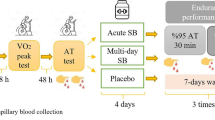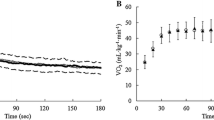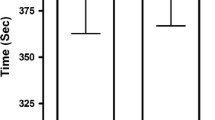Abstract
The purpose of the current investigation was to determine whether sodium citrate enhances endurance cycling performance and, if so, what dosage(s) produces this effect. Eight trained [peak power output: 362 (48) W; power:weight: 5.1 (0.4) W · kg−1, mean (SD)] male cyclists were requested to complete four, 40-km time-trials, each separated by 3–7 days, on their own bicycles, mounted on a Kingcycle ergometer. To mimic the stochastic nature of cycle road races, the time-trials included four 500-m, four 1-km and two 2-km sprints. The experimental conditions involved the ingestion of three dosages of sodium citrate dissolved in 400 ml water: 0.2 g · kg−1, 0.4 g · kg−1 and 0.6 g · kg−1 body mass (b.m.) and a placebo (calcium carbonate, 0.1 g · kg−1 b.m.). Subjects were asked to complete both the sprints and total distance in the fastest time possible. Venous blood samples were collected before, as well as at 10-km intervals during the trials for the analysis of plasma lactate and glucose concentrations and for the measurement of blood pH and PCO2 levels. Immediately before, as well as during exercise, pH was significantly higher in the group ingesting the highest citrate dose (range 7.36–7.45) compared to the placebo (range 7.31–7.39) and the two lower citrate dosages. Despite this, no significant differences in power output (P=0.886) or time taken to complete the 40 km (P=0.754) were measured between the four trials. The average performance times (in min:s, with SD in parentheses) and average power output (in W) for the 40-km time-trials were: 58:46 (5:06) [265 (62) W], 60:24 (6:07) [251 (59) W], 61:47 (5:07) [243 (44) W] and 60:02 (5.05) [255 (55) W] for the 0.2, 0.4, 0.6 g · kg−1 b.m. sodium citrate and placebo trials, respectively. There were also no significant differences measured between treatments in terms of time, power output, speed or heart rate during the 500-m, 1-km and 2-km sprints. The ingestion of increasing sodium citrate dosages before exercise produced dose-dependent changes in pH, base excess and HCO− 3 concentrations before and during the 40-km time-trial. However, these changes influenced neither the time-trial time nor the sprinting performance times.
Similar content being viewed by others
Author information
Authors and Affiliations
Additional information
Accepted: 7 June 2000
Rights and permissions
About this article
Cite this article
Schabort, E., Wilson, G. & Noakes, T. Dose-related elevations in venous pH with citrate ingestion do not alter 40-km cycling time-trial performance. Eur J Appl Physiol 83, 320–327 (2000). https://doi.org/10.1007/s004210000264
Issue Date:
DOI: https://doi.org/10.1007/s004210000264




